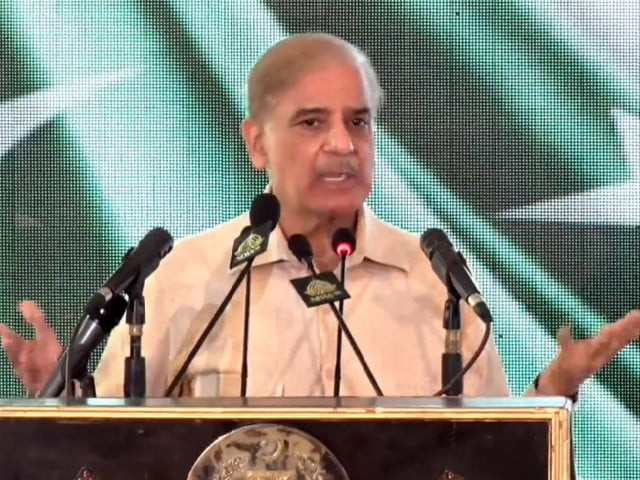PM renews call for charter of economy
Addressing a pre-budget moot, premier calls for launching ‘Charter of Economy’ to put country back on path of progress

Prime Minister Shehbaz Sharif on Tuesday repeated his call for formulating a ‘charter of economy’, urging all stakeholders to join hands to launch “an unalterable policy framework” to help the country achieve agro-based and export-oriented growth.
Addressing a ‘Pre-Budget Conference’, the prime minister underscored that there could be no economic stability without political stability in the country. He said that the government was focusing on short- and medium-term plans because of the limited time in its tenure.
“I’m asking for a prudent and comprehensive approach for an economic turnaround,” Shehbaz told the conference. “That is why I am asking all stakeholders to meet the challenge of time to turn the country’s economy around,” he added.
“It is important that without political stability, there can be no economic stability, and vice versa,” he said, stressing the need for a charter of economy. “No matter what happens, whichever party comes into power, the goals set in the ‘charter of economy’ will remain unchanged. It will become our sacred trust, which will not change. We need this.”
Shehbaz stressed that enhancement of exports, agricultural yield and financial management should be the major components of the plan. “The government will form task force on agriculture and exports for formulating comprehensive plans,” he said.
The conference gathered agriculturists, information technology experts, businessmen and investors from across the country, who shared their proposals with the government, relating to their respective areas. Shehbaz thanked them for their inputs during the six-hour long session.
Also read: Miftah predicts 5%-6% GDP growth in next fiscal year
He asked “everyone” to sit down, develop the charter and sign it so that Pakistan could continue an approach of economic development for decades to come. “This is high time to turn the tide; it is difficult but not impossible,” he remarked.
He said that Pakistan lagged behind because of the non-execution of development plans, while other nations like India excelled. “Being rich with resources, human talent and dedication, Pakistan can also achieve excellence through efficiency and modern techniques,” he added.
The prime minister called for the use of modern technology in the field of agriculture and boosting the performance of the industries and exports. He announced the constitution of a task force to work in these areas.
He stressed the need for developing the rural areas, which was home to 65% of the country’s population, saying that movement from underdeveloped to the developed areas put strains on the resources of cities. “This can only happen when our children get quality education there.”
Shehbaz mentioned that after the 18th Amendment, provinces were empowered and the Federation’s powers were devolved. He said that the provinces and the Centre would have to work together to develop a comprehensive plan.
Comparing the country’s information technology (IT) industry with that of India’s, the prime minister said that the latter generates around $200 billion, while Pakistan’s industry was hovering around $2.5 billion. “We must go for special export industrial zones,” he said.
Tough measures
Talking about the tough decisions being taken by the government, Prime Minister Shehbaz said that the non-productive assets should be taxed. “The windfall profits in the real estate should also be taxed,” he said.
Addressing the conference earlier, Finance Minister Miftah Ismail said that the incumbent government had to take difficult decisions to put the economy on track, and added that it could take more drastic measures if required to improve it.
He said that the government was determined to present a progressive budget for the next financial year 2022-23 with special focus on fiscal consolidation to bring down the budget deficit below 5% of the Gross Domestic Product (GDP).
He said an effective strategy had been evolved to achieve a 6% GDP growth rate, while strategic measures being planned to control inflation. He said that the government inherited a difficult economic situation but it would leave it in a much better condition at the end of its tenure.
“You are all with us, we will leave it in a better position,” the minister said. “The government has re-engaged with Saudi Arabia, China, the UAE [United Arab Emirates] and other friendly countries, and it will hopefully help improve the situation,” he added.
Speaking about providing support to the vulnerable segments of the society, the minister announced that the government would provide stipend to around 14 million people, approximately one third of the country’s population.
Criticising the previous Pakistan Tehreek-e-Insaf (PTI) government, he said in the last four years, some 20 million people went below the poverty line while 600,000 people lost their jobs during that period.
“Around 2 million people join the labour market every year, therefore, the country needs around 6% economic growth rate to absorb them. However, negative growth during the PTI regime led to unemployment and increase in poverty,” he said about the budgetary targets.
He also blamed the PTI government for the rising budget deficit 6.5% of the GDP at the end to the PML-N’s government to 9.1% during the current fiscal year. “The average debt taken by the PTI government stood at Rs 5,177 billion against the PML-N government’s Rs 2,132 billion.”
He said that Rs1,072 billion power subsidy during the current year increased the circular debt to Rs 1,600 billion. Also, he added, the petroleum sector was given Rs81 billion subsidy, while it had a circular debt of around 400 billion.
“The country needs about $41 billion for debt payment of $ 21 billion over the next 12 months and building forex reserves up to $18 billion,” he said, adding that the government had re-engaged with the International Monetary Fund (IMF) and an agreement would be signed soon.
Overall, the minister pointed out that Pakistan’s growth model was not perfect. “Incentives are given to the rich industrialists to install new factories for jobs creation but it results into increasing the import bill owing to new machinery and consumer goods,” he said.
“With increasing imports, the current account deficit starts growing and then to control it we have no option but to slow down the economy that ultimately leads to cut in jobs,” he said. “We should emphasise on imports substitution to curtail the current account deficit,” he continued.
“We should also go for exports promotion as a sustainable solution. Pakistan, should adopt the option of focusing more on exports promotion, he said. “High imports are not the main problem, but the main problem is that our exports are very low.”
The minister assured the exporters that they would get the energy at regional competitive prices as the tariffs would not be more than the regional countries. He expressed the government’s determination to increase the exports by 20% in the ongoing year.
In order to boost agricultural productivity, he said that only farmers would get direct subsidy, and not the fertiliser companies. About the privatisation process, he said the government would continue the process.
About the recent hike in the prices of petroleum products, Ismail said the government had to enhance the prices under compulsion, otherwise, it would have to incur a loss of Rs120 billion per month – three times more than the expenditures.
Later in a tweet the minister clarified that the government had made no increase in the petroleum prices. He said that there was no summary or plan to increase the petroleum prices.
1654662628-0/PM-(1)1654662628-0.jpg)



















COMMENTS
Comments are moderated and generally will be posted if they are on-topic and not abusive.
For more information, please see our Comments FAQ